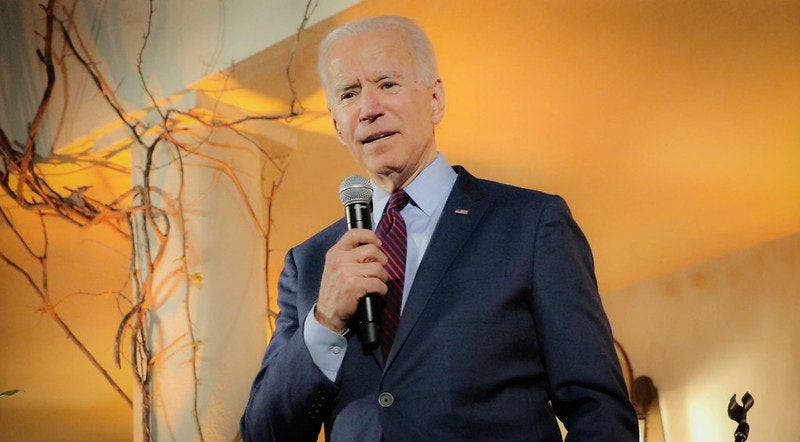Corporate drive for sustainability creates space for Biden plan initiatives
RIDGEWOOD, NJ. (Callaway Climate Insights) — In a tumultuous year which will be forever remembered by the impacts of Covid-19, racial injustice, and the adverse effects of climate change, one story that has been overshadowed is the mainstreaming of sustainable investing with investor demand at an all-time high.
A cornerstone of this phenomenon is the recognition that climate change and other environmental, social and governance (ESG) factors are investment risks. This is now being acknowledged at the highest levels of finance and embraced by some of the largest financial firms, including BlackRock (BLK) and State Street (STT).

Joe Biden speaking at an event in March. Photo: Louise Palanker/flickr.
Underpinning the case for sustainable investing has been a transformation taking place in corporate America. Many leading U.S. companies have been integrating sustainability into their businesses and are doing so out of their own economic self-interest. Some 90% companies in the S&P 500 are reporting on key sustainability metrics and many of these companies have been re-aligning their business models to prepare for a low-carbon future. Corporations also recognize there is growing pressure to shift to a model of capitalism that benefits all stakeholders, including workers, suppliers, customers, communities and shareholders. The Business Roundtable, whose members include some of the largest companies in the U.S., codified the movement to this stakeholder model with their well-publicized statement to redefine the purpose of a corporation.
All of this has been occurring despite any significant government regulation or policies, and it is fair to say this trend will continue without political support.
There is an irony here. “What has happened with business leadership around sustainability amongst large corporations is that it has created some political space for politicians to be more ambitious about trying to bring standards up,” says Mark Campanale, founder and executive chairman of Carbon Tracker.
That said, it is interesting to consider the potential impacts of an administration that will be highly supportive of the ongoing sustainability transformation.
Democratic presidential nominee Joe Biden’s Biden Plan for clean energy calls for complete decarbonization of the U.S. electrical grid by 2035 and the goal to achieve a 100% clean energy economy and net-zero emissions no later than 2050.
Other notable highlights include building a modern infrastructure, significant investment to upgrade energy efficiency in buildings, the electrification of our transportation system and historic investment in clean energy innovation.
Further, Biden’s plan would directly support the nascent shift to stakeholder capitalism, with multiple initiatives focused on workers and local communities.
It appears that companies involved in clean energy, energy efficiency and infrastructure will be the obvious beneficiaries of a Biden administration.
While it may be easy to dismiss Biden’s agenda as shiny campaign promises, never before has there been the urgency to act on climate combined with an opportunity to transform our economy.
“There is no reason why the U.S. couldn’t be a dominant manufacturer of electric vehicles and a dominant player in the renewable energy space and in energy efficiency and energy systems management. These are huge areas of opportunity for U.S. companies,” says Campanale. “The question is whether Biden understands this, and I think he does.”
Underscoring the strong intentions of a Biden administration to act on climate, rumors have emerged in recent days indicating Biden may appoint a climate czar (possibly John Kerry or John Podesta) to help oversee the implementation of climate policies across various government agencies.
One cannot overlook the fact that under Biden’s ambitious agenda, every company across every sector will be under increasing pressure to decarbonize. Additionally, there will likely be an increasing focus on how companies treat all stakeholders. From an investment perspective, there has been a significant investment performance disparity between sustainability leaders and laggards over the past few years, as noted by this ESG Primer from Bank of America/Merrill Lynch.
While it is likely that current sustainability momentum will continue regardless of politics, it seems likely that Biden’s proposed policies will further accelerate existing trends.
A Biden win will likely increase the focus on corporate sustainability performance, provide further tailwinds to companies that are embracing sustainability, while creating further risks for companies that have been lagging their peers.
For investors, it is clear that ESG analysis will be crucial in order to truly understand a company’s value. There has never been a better time to consider shifting to sustainable investing.
Here is a summary of key points investors may want to anticipate under a Biden administration:
- Companies leading on sustainability are likely to continue to outperform
- Companies lagging their peers on sustainability may carry additional risks and are likely to underperform
- The performance disparity between sustainability leaders and laggards may accelerate
- Sustainable investing strategies will likely continue to outperform broader benchmarks and traditionally managed strategies that do not integrate ESG analysis
- Capital is more likely to flow toward companies acting in the best interests of workers, suppliers, customers and local communities in addition to shareholders
- Companies that are innovating technology and solutions to clean energy, energy efficiency, and electric transportation should thrive

